The Dell XPS 13 (9300) Review: Return of the King
by Brett Howse on July 16, 2020 10:00 AM ESTSystem Performance
When we reviewed the XPS 13 2-in-1 back in November, it was the first device we had tested which featured the new 10 nm Intel Ice Lake platform. At that time, Dell had also recently refreshed the XPS 13, but had outfitted it with the older 14 nm Comet Lake platform. For the all-new XPS 13, Dell has now brought parity to their lineup with Ice Lake here as well, with the improvements that platform brings, especially to the graphics side.
Dell offers three processor options. The least-expensive offering is the Core i3-1005G1, the mid-tier outfitted with the Core i5-1035G1, and the top-tier offering the Core i7-1065G7. Our review unit features the Core i7 model, as Dell wanted to put its best foot forward.
On the memory side, Dell’s spec sheet shows a 4 GB base, although thankfully that is nowhere to be found on their Dell.com site, at least for the USA. Thanks to the move to LPDDR4X with Ice Lake, Dell now offers up to 32 GB of memory on the XPS 13. Storage is all PCIe x4 NVMe, with 256 GB as the base, and a 2 TB maximum.
To see how the XPS 13 performs, we have run it through our newly updated laptop suite. Please not that if a graph does not contain a specific older device, that means that the test has not been run on it. Since the laptops are returned to the manufacturer after review, we cannot do any regression testing for the most part. If you’d like to compare the XPS 13 to any other laptop we have tested, please refer to our Online Bench.
PCMark
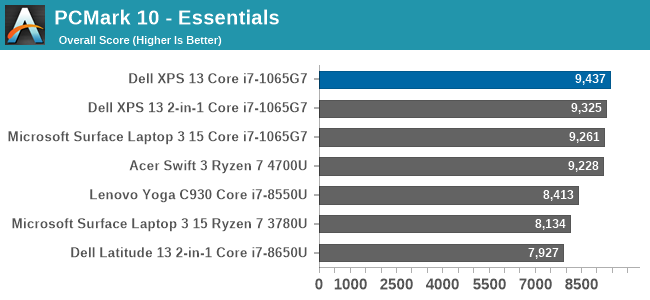
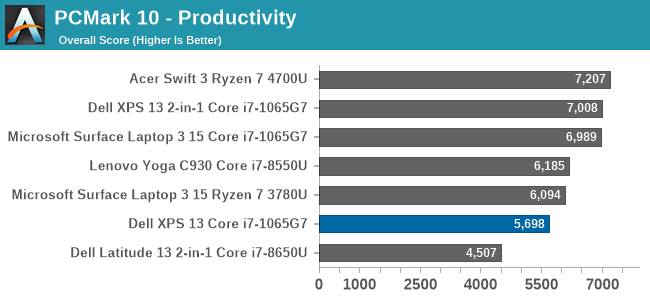
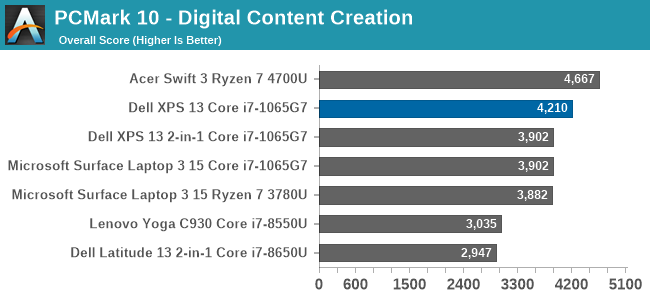
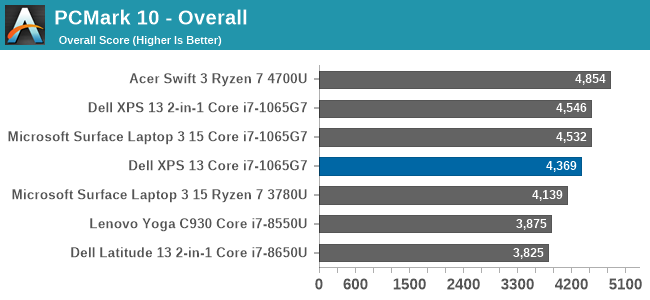
UL’s PCMark 10 is a whole-system benchmark, testing everything from CPU performance to app loading time. The Overall score consists of three categories, each featuring their own unique sub-tests. Overall the XPS 13 scored right in the same ballpark as other Ice Lake notebooks, although was slightly down in the Productivity tests, but slightly ahead in the other two.
Cinebench
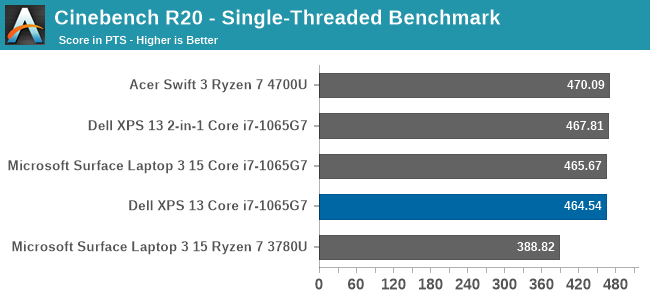
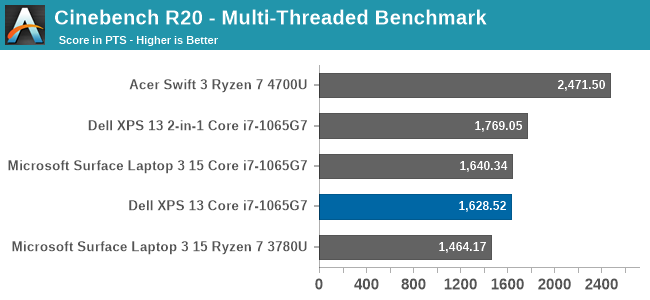
Cinebench, based on Maxon’s Cinema 4D rendering, allows tests of both single-threaded and multi-threaded runs, making it one of the more popular tests for overall computational performance. The XPS 13 does well compared to other Ice Lake equipped notebooks, although with AMD offering up to 8 cores in the same 15-Watt TDP, Intel falls behind in the multi-threaded run.
Handbrake
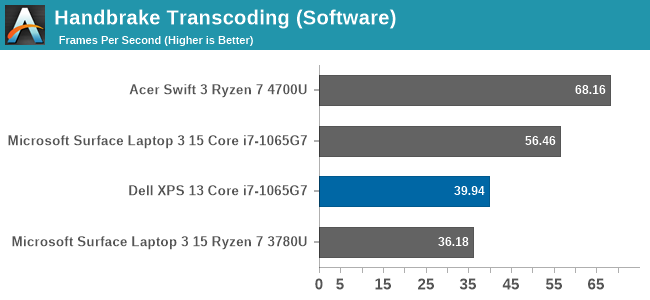
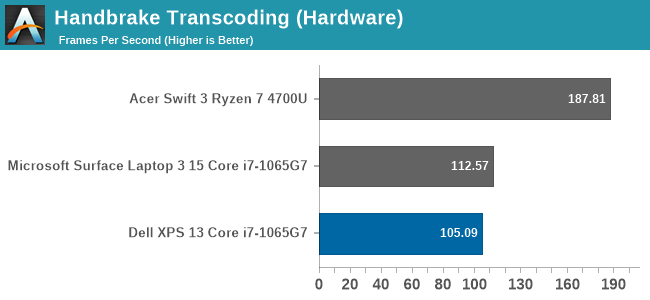
In our Handbrake encoding test, we transcode a 1080p movie to 720p using both software and hardware encoders. Software encoders utilize the CPU, and are generally the preferred method for optimal quality, whereas hardware encoders leverage the media blocks, which in this case is Intel’s QuickSync, for a much faster encode. As we will see more in the thermals section, Dell limits the XPS 13 to a 15-Watt TDP even in its maximum performance mode, where some other manufacturers will allow for higher than listed TDP, up to 20 Watts or so, and as such, the XPS 13 falls a bit behind other Ice Lake notebooks in this test which is TDP limited.
7-Zip
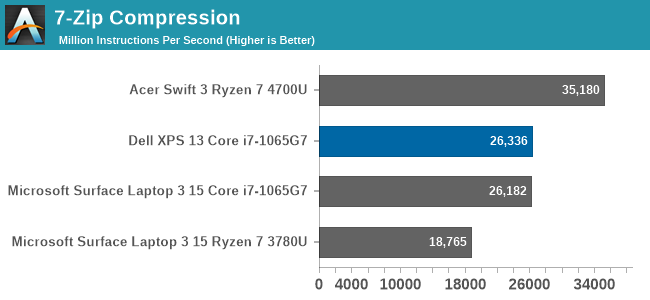
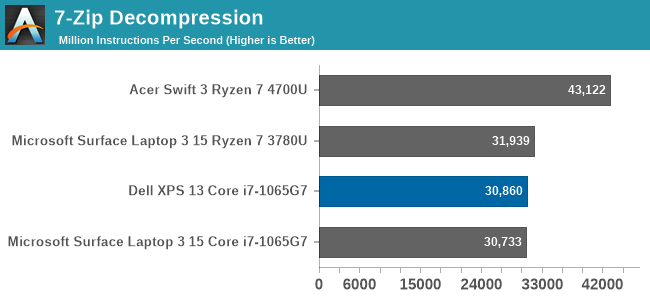
The popular file compression and decompression tool 7-Zip includes a built-in benchmark, and once again the XPS 13 slots right into where other Ice Lake notebooks fit.
Web Tests
Web performance is a function of not only the CPU performance, but also the browser’s scripting engine, and as such we have standardized on the Microsoft Edge browser. Microsoft has now transitioned their browser to the open-source Chromium project. Due to this, we have reset our web tests to use the new Chromium based Edge and taken the opportunity to decommission some of the older tests. We will now focus on Speedometer 2.0 and WebXPRT 3.
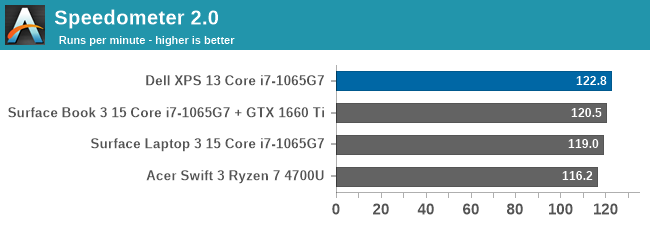
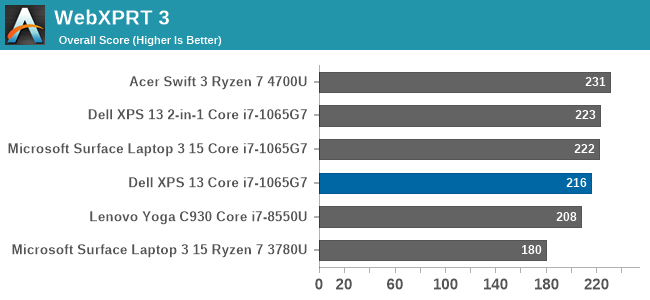
The XPS 13 again slots right in where you would expect for an i7-1065G7 based system.
Storage Performance
Dell offers from 256 GB to 2 TB of PCIe storage, and the review unit was outfitted with the Intel 600p 512 GB drive. We are transitioning to the PCMark 10 storage benchmark, which uses test traces of actual common workloads, such as booting Windows, and many of the Adobe applications, and as such should be a much better indicator of drive performance than just maximum transfer rates.
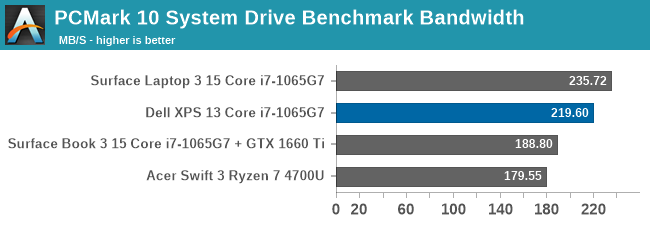
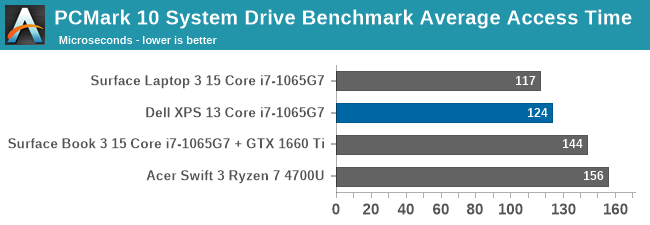
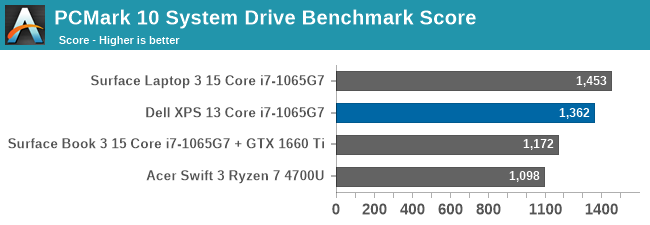
The Intel 600p performs quite well, with good access times and solid bandwidth. Surprisingly, it can’t quite match the excellent performance we saw from the SK Hynix 2230 form factor SSD in the Surface Laptop 3, but almost matches it.


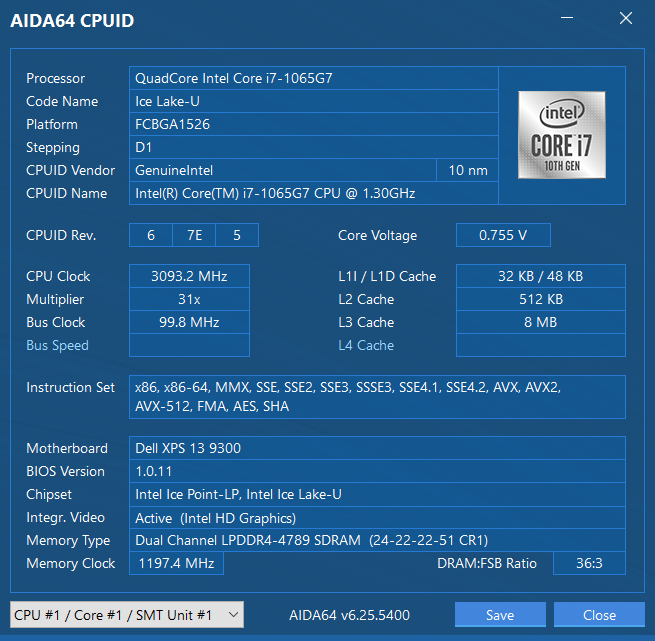








224 Comments
View All Comments
GreenReaper - Thursday, July 16, 2020 - link
So frustrating that Dell made yet another XPS hamstring by its thermal dissipation ability. The see-sawing ruins these systems for my brother, who happens to like to play a few games after work. It used to be possible to undervolt to fix this, but now I Tel has sent out firmware updates to disable that because it's protecting SGX enclaves from the Plundervolt vulnerability. I certainly won't be recommending this new version to him.flowingbass - Thursday, July 16, 2020 - link
I see dell is still under intel's payrollhaukionkannel - Thursday, July 16, 2020 - link
Ofcourse! It is the best way of making money. People buy Intel laptops. It does not matter if Intel cpus Are bad, people still buy them. Amd can make better cpus and people still don`t buy AMD laptops... so They Are making the only sensible thing... by usining intel cpus. They want to make money and sell laptops...sonny73n - Friday, July 17, 2020 - link
I’m buying an AMD laptop. Bite me.Spunjji - Friday, July 17, 2020 - link
I love it when people use the results of a tilted system to justify the continued existence of a tilted system. Circular arguments are so *neat*! 😐trivik12 - Thursday, July 16, 2020 - link
I hope we see a tigerlake version this year and an AMD version soon as well. Quality of display and build quality is great.Deicidium369 - Thursday, July 16, 2020 - link
Tiger Lake will be in the premium Dells - AMD won'tLenovo's new systems are Tiger Lake and there is an almost identical system with the top end Renoir - the Tiger Lake system wrecks the Renoir iGPU and with 4C vs 8C only 17% slower - those are benchmarks on Jul 3 2020.
Korguz - Friday, July 17, 2020 - link
still touting that cherry picked BS, huh ?mrvco - Thursday, July 16, 2020 - link
Other than gaming I'm primarily a Mac user, but the XPS 13 DE has been on my radar as a Linux machine. I'm still surprised that Apple hasn't been more aggressive with their updates to the 13" MacBook Pro to better compete with the XPS 13.Deicidium369 - Thursday, July 16, 2020 - link
XPS13 is the benchmark in that segment